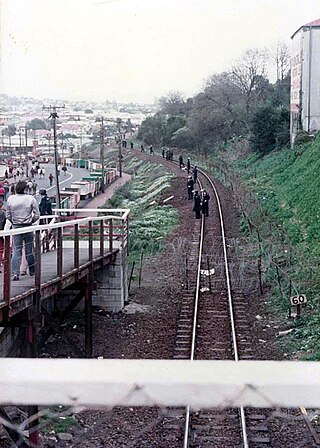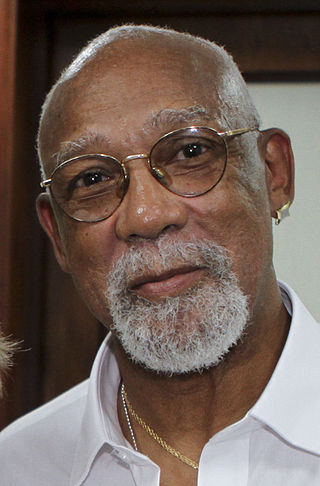Black power is a political slogan and a name for various associated ideologies aimed at achieving self-determination for people of African descent.
Contents
Black Power may also refer to:
Black power is a political slogan and a name for various associated ideologies aimed at achieving self-determination for people of African descent.
Black Power may also refer to:
Black is a racialized classification of people, usually a political and skin color-based category for specific populations with a mid to dark brown complexion. Not all people considered "black" have dark skin; in certain countries, often in socially based systems of racial classification in the Western world, the term "black" is used to describe persons who are perceived as dark-skinned compared to other populations. It is most commonly used for people of sub-Saharan African ancestry and the indigenous peoples of Oceania, though it has been applied in many contexts to other groups, and is no indicator of any close ancestral relationship whatsoever. Indigenous African societies do not use the term black as a racial identity outside of influences brought by Western cultures. Following the murder of George Floyd in 2020, several style guides, including the AP Stylebook, changed their guides to capitalize the "b" in black in 2020. The ASA Style Guide says that the "b" should not be capitalized. Some perceive the term "black" as a derogatory, outdated, reductive or otherwise unrepresentative label, and as a result neither use nor define it, especially in African countries with little to no history of colonial racial segregation.

The 1981 South African rugby tour polarised opinions and inspired widespread protests across New Zealand. The controversy also extended to the United States, where the South African rugby team continued their tour after departing New Zealand.

Kwame Ture was a prominent organizer in the civil rights movement in the United States and the global pan-African movement. Born in Trinidad, he grew up in the United States from the age of 11 and became an activist while attending the Bronx High School of Science. He was a key leader in the development of the Black Power movement, first while leading the Student Nonviolent Coordinating Committee (SNCC), then as the "Honorary Prime Minister" of the Black Panther Party (BPP), and last as a leader of the All-African People's Revolutionary Party (A-APRP).

The Roman salute is a gesture in which the right arm is fully extended, facing forward, with palm down and fingers touching. In some versions, the arm is raised upward at an angle; in others, it is held out parallel to the ground. In contemporary times, the former is commonly considered a symbol of fascism that had been based on a custom popularly attributed to ancient Rome. However, no Roman text gives this description, and the Roman works of art that display salutational gestures bear little resemblance to the modern Roman salute.

Civil rights movements are a worldwide series of political movements for equality before the law, that peaked in the 1960s. In many situations they have been characterized by nonviolent protests, or have taken the form of campaigns of civil resistance aimed at achieving change through nonviolent forms of resistance. In some situations, they have been accompanied, or followed, by civil unrest and armed rebellion. The process has been long and tenuous in many countries, and many of these movements did not, or have yet to, fully achieve their goals, although the efforts of these movements have led to improvements in the legal rights of some previously oppressed groups of people, in some places.
The one-drop rule was a legal principle of racial classification that was prominent in the 20th-century United States. It asserted that any person with even one ancestor of black ancestry is considered black. It is an example of hypodescent, the automatic assignment of children of a mixed union between different socioeconomic or ethnic groups to the group with the lower status, regardless of proportion of ancestry in different groups.

Tommie C. Smith is an American former track and field athlete and former wide receiver in the American Football League. At the 1968 Summer Olympics, Smith, aged 24, won the 200-meter sprint finals and gold medal in 19.83 seconds – the first time the 20-second barrier was broken officially. His Black Power salute with John Carlos atop the medal podium to protest racism and injustice against African Americans in the United States caused controversy, as it was seen as politicizing the Olympic Games. It remains a symbolic moment in the history of the Black Power movement.
The raised fist, or the clenched fist, is a long-standing image of mixed meaning, often a symbol of political solidarity. It is also a common symbol of anti-fascism, socialism, communism, anarchism, and other revolutionary social movements. It can also represent a salute to express unity, strength, or resistance.

John Wesley Carlos is an American former track and field athlete and professional American football player. He was the bronze-medal winner in the 200 meters at the 1968 Summer Olympics, where he displayed the Black Power salute on the podium with Tommie Smith. He went on to tie the world record in the 100-yard dash and beat the 200 meters world record. After his track career, he enjoyed a brief stint in the Canadian Football League but retired due to injury.
A prison gang is an inmate organization that operates within a prison system. It has a corporate entity and exists into perpetuity. Its membership is restrictive, mutually exclusive, and often requires a lifetime commitment. Prison officials and others in law enforcement use the euphemism "security threat group". The purpose of this name is to remove any recognition or publicity that the term "gang" would connote when referring to people who have an interest in undermining the system.
AP, A&P, A-p, Ap, A/P, or ap may refer to many topics. While the most common one is the Associated Press, they may also refer to:
Black Pride in the United States is a movement which encourages black people to celebrate African-American culture and embrace their African heritage. In the United States, it was a direct response to white racism especially during the Civil Rights Movement. Stemming from the idea of Black Power, this movement emphasizes racial pride, economic empowerment, and the creation of political and cultural institutions. Related movements include black power, black nationalism, Black Panthers and Afrocentrism.
Black Power is a prominent gang in New Zealand. Members are predominantly Māori and Polynesian.

During their medal ceremony in the Olympic Stadium in Mexico City on October 16, 1968, two African-American athletes, Tommie Smith and John Carlos, each raised a black-gloved fist during the playing of the US national anthem, "The Star-Spangled Banner". While on the podium, Smith and Carlos, who had won gold and bronze medals respectively in the 200-meter running event of the 1968 Summer Olympics, turned to face the US flag and then kept their hands raised until the anthem had finished. In addition, Smith, Carlos, and Australian silver medalist Peter Norman all wore human-rights badges on their jackets.

There are numerous gangs in New Zealand, of varying criminality, organisation and ethnicity, including outlaw motorcycle gangs, street gangs and ethnically based gangs. A chapter of the Hells Angels motorcycle club was formed in Auckland in 1961, the first Hells Angels chapter outside the US. Soon after, the Mongrel Mob formed in Hastings and Wellington, developing into a predominantly Māori and Pacific Islander gang, and having the largest membership in the country. Through the 1960s and 1970s, other outlaw motorcycle clubs and ethnically based gangs formed, including another predominantly Māori gang, Black Power, which grew to rival the Mongrel Mob.

The Olympic Project for Human Rights (OPHR) was an American organization established by sociologist Dr. Harry Edwards and multiple Black American athletes, including noted Olympic sprintersTommie Smith and John Carlos, on October 7, 1967. The purpose of the group was to advocate forcivil rights and human rights for Black people in the United States and abroad, along with protesting racism in sports in general. The OPHR proposed a complete Black athlete boycott of the 1968 Summer Olympics in Mexico City to achieve its goals. While the OPHR advocated for a boycott backed by all Black Americans, the group did not actively include women in its discussions and in the end was mostly composed of track and field athletes.
Black Power is a political slogan and a name which is given to various associated ideologies which aim to achieve self-determination for black people. It is primarily, but not exclusively, used by black people activists and proponents of what the slogan entails in the United States. The Black Power movement was prominent in the late 1960s and early 1970s, emphasizing racial pride and the creation of black political and cultural institutions to nurture, promote and advance what was seen by proponents of the movement as being the collective interests and values of black Americans.

The Black Panther Party was a Marxist-Leninist and black power political organization founded by college students Bobby Seale and Huey P. Newton in October 1966 in Oakland, California. The party was active in the United States between 1966 and 1982, with chapters in many major American cities, including San Francisco, New York, Chicago, Los Angeles, Seattle, and Philadelphia. They were also active in many prisons and had international chapters in the United Kingdom and Algeria. Upon its inception, the party's core practice was its open carry patrols ("copwatching") designed to challenge the excessive force and misconduct of the Oakland Police Department. From 1969 onward, the party created social programs, including the Free Breakfast for Children Programs, education programs, and community health clinics. The Black Panther Party advocated for class struggle, claiming to represent the proletarian vanguard.
Black nationalism is a type of racial nationalism or pan-nationalism which espouses the belief that black people are a race, and seeks to develop and maintain a black racial and national identity. Black nationalist activism revolves around the social, political, and economic empowerment of black communities and people, especially to resist their cultural assimilation into white culture, and maintain a distinct black identity.